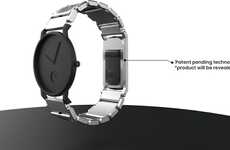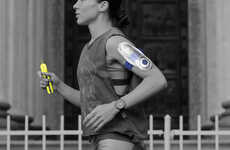
The 'Worldbeing' Shows How Your Choices Affect the Environment
Cadhla Gray — October 3, 2015 — Eco
References: layerdesign & fastcodesign
This carbon footprint-tracking wearable is both eco-friendly in its production design as well as its purpose. The 'Worldbeing' was created by Benjamin Hubert from design agency 'Layer,' in order to raise awareness of the daily effects individuals have on the environment. From things like how far and how they travel, to where they buy groceries, this wearable monitors users' actions in the hopes of improving upon them.
Carbon footprint-tracking is usually relatively time-consuming and takes a concerted effort. However, the Worldbeing monitors everything automatically for users. Aside from travel information, the bracelet also has a wireless payment system that connects to the app to provide users with information about the sustainability of that particular store.
Keeping in line with its sustainable purpose, the bracelet itself is made from recycled e-waste and has an e-ink display rather than an OLED, making the wearable more energy efficient.
Carbon footprint-tracking is usually relatively time-consuming and takes a concerted effort. However, the Worldbeing monitors everything automatically for users. Aside from travel information, the bracelet also has a wireless payment system that connects to the app to provide users with information about the sustainability of that particular store.
Keeping in line with its sustainable purpose, the bracelet itself is made from recycled e-waste and has an e-ink display rather than an OLED, making the wearable more energy efficient.
Trend Themes
1. Eco-friendly Wearables - There's an opportunity for businesses to create wearable technology with a focus on sustainability and promoting eco-friendly behaviors.
2. Automated Carbon Footprint Tracking - Businesses can develop technology that automates the process of tracking an individual's carbon footprint, making it easier and more accessible for consumers.
3. Sustainability-driven Payment Systems - Companies could create payment systems that provide information about the sustainability of the stores consumers are buying from, giving them the ability to make more informed purchases.
Industry Implications
1. Wearable Technology - The wearable technology industry has the opportunity to create more eco-friendly and purpose-driven products.
2. Sustainability Consulting - Businesses specializing in sustainability consulting could expand their services to include technology that tracks and reduces individuals' carbon footprint.
3. Mobile Payment Systems - Mobile payment system companies can innovate by incorporating sustainability metrics into their services to inform consumers about environmentally conscious purchasing options.
5.5
Score
Popularity
Activity
Freshness























